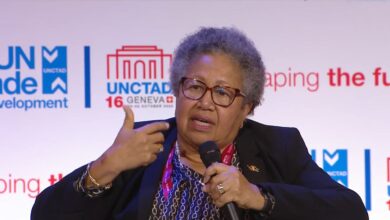(CARICOM Secretariat, Turkeyen, Greater Georgetown, Guyana) Saint Lucia’s Prime Minister, Honourable Stephenson King has asserted that while negotiations of a new Global Climate Change Agreement are about ‘give and take’ there would be no ‘horse-trading’ of the inalienable rights of survival and development of the peoples of the Caribbean Community (CARICOM).
Delivering the feature address at a special ministerial conference on Climate Change and Development at the Bay Gardens Hotel in Saint Lucia on Tuesday morning, the Lead Head of Government for Sustainable Development in the CARICOM Quasi-cabinet acknowledged the need for flexibility in the negotiations for a new Global Agreement on Climate Change, but hastened to point out that some things would always be non-negotiable.
“Our right to exist, our right to pursue sustainable development, can never be placed on the bargaining table. Our survival cannot be exchanged, bought or sold,” he declared. The Meeting, held with the support of the Spanish government, is part of the Region’s preparations for participation in the United Nations Framework Convention on Climate Change (UNFCC) to be held in Copenhagen, Denmark in December
CARICOM has thrown its support behind the Alliance of Small Island Developing States (AOSIS), which has been spear-heading the negotiations for Small Island Developing States (SIDS) and despite pressure, the AOSIS has been resolute in its position to seek, in the negotiations, an ambitious reduction in Green House Gas Emission to a target of 1.5 degree Celsius, which would in effect stabilise the process of global warming.
According to Prime Minister King, while many other Parties had proposed alternative targets, AOSIS has maintained the position that allowing a temperature increase of more than 1.5 degrees and pursuing an emissions reduction timeline less urgent or stringent than what it has proposed (a timeline of 2015) would literally signal the death-knell for many small-island civilisations in the short and long-term.
Notwithstanding the critical importance of reducing GHG emissions, the Prime Minister said, the Region must also focus on the other issues. Citing adaptation as one such critical issue, Prime Minister King urged the Region to focus on implementing and mobilising actions on adaptation at all levels to address current and future impacts.
“Our negotiators must continue now, to make the case for enhanced action on adaptation up to and beyond 2012 that gives priority to vulnerable developing countries such as ours,” he said.
He stated that any mitigation measure adopted must be supported by a flexible country-driven approach based on five predicates: Institutional arrangements under the Convention process to coordinate efforts to support country-driven priorities; new, additional and predictable financial resources, separate and apart form Overseas Development Assistance, supported by appropriate institutional mechanisms; a dedicated funding mechanism for adaptation; risk management and risk reduction strategies, including risk sharing and transfer mechanisms, such as insurance through a mechanism to address loss and damage from Climate Change impacts; and enhanced capacity and knowledge sharing and transfers of adaptation technologies.
With respect to Mitigation, the Saint Lucia Prime Minister said Caribbean negotiators must push for the Nationally Appropriate Mitigation Actions described as NAMAs to be truly “nationally appropriate” and to reflect the national circumstances of respective groups of countries, while contributing to overall global emissions reductions in a measurable way.
In addition to those issues, Prime Minister King said in keeping with the July 2009 Liliendaal Declaration on Climate Change and Development, the Caribbean must work towards addressing the outstanding issues relating to Reduced Emissions from Deforestation and Degradation (REDD) as this mechanism he asserted, had tremendous potential to reduce GHG emissions.
He reiterated his call for the Caribbean to work and dialogue together, concluding that, given the vulnerable position of the Caribbean to the threats of Climate Change, “we have no option but to ensure a collective and unified response to the negotiations,” and acknowledging that “dialogue is the means by which we anticipate that we will achieve the desired outcomes.”
However, he warned that CARICOM should not allow itself to be distracted in the process of dialogue but should be “clear in our minds, and know what we want in Copenhagen. We must be focused and must, always, keep our ultimate objective in mind, with great clarity,” he concluded.





